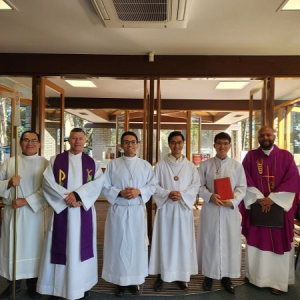Peter MALONE
Fifth General Councillor, Gene A. Pejo MSC, Philippines.
Fifth General Councillor, Gene A. Pejo MSC, Philippines

We conclude our series on our new General Council.
My name is Gene (Genie) A. Pejo, MSC. I was born on April 27, 1960. I joined the MSC-Philippine Province in 1986 as a Postulant and did my Novitiate Formation in 1987. I made my first temporary profession in 1988 and had my final profession as MSC on June 2, 1992. I was ordained priest on April 27, 1994. My first pastoral placement was in Virgen de la Regla Parish in Lapu-Lapu City, Cebu as an Assistant Parish Priest. Then in June F1995 I was transferred to St. John the Evangelist Parish, in Guimba, Nueva Ecija, still as an Assistant Parish Priest.

In June 1996 I was asked to join the formation team of our Post-Novitiate Formation, and at the same time undergoing a two-year Formative Spirituality Course at Emmaus Center for Spirituality, in Quezon City Philippines. In 1999 I became the Director of Scholastics. I also served for two years as MSC District Superior of Manila. In 2003 I was assigned Parish Priest at Immaculate Conception Parish in Butuan, Agusan del Norte, but prior to my parish assignment I also served as a Provincial Council Member for three years, and chairperson of Commission on Initial Formation. I also served as District Superior-Agusan District while serving as Parish Priest in Immaculate Conception Parish. In June 2006 I became the Director of Novices until June 2011 at the same time a member of the Provincial Council.
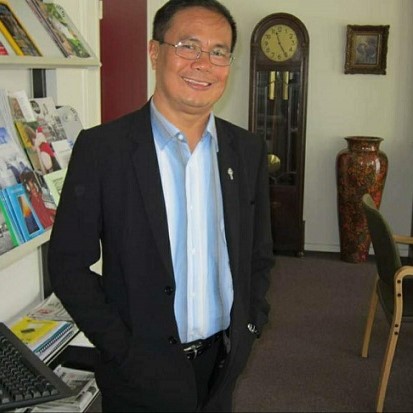
In February 2011 I was elected Provincial Superior and served for two terms until February 2017. In the same year I had my Sabbatical Year and in 2018 I was assigned in Surigao City as Assistant Parish Priest. In 2023 I was sent to Vietnam to become part of the formation team of MSC Vietnam, and this was my last assignment prior to my present assignment in the General Leadership Team.
MSC Formation, Blackburn, Conferring of Ministries.
MSC Formation, Blackburn, Conferring of Ministries.
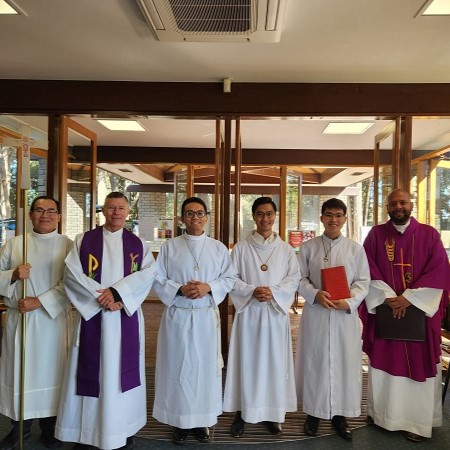
On Friday morning, March 22nd, there was a ceremony for the conferring of the Ministries of Lector and Acolyte, part of the steps towards ordination.
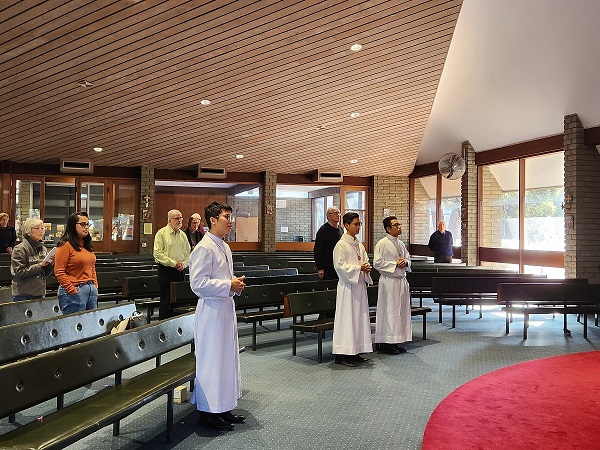
Acknowledging our four professed MSC men in formation in Australia: Trieu Nguyen and Daniel Magadia made their final vows last December. Vincent Phan made his first vows at the end of 2021. Hoa Tran, first professed in Vietnam, renewed his vows at the beginning of 2022 at Treand House.
Delegated to confer the ministries by the Provincial was Kimi Vunivesilevu MSC, First Councillor, community leader at St Mary’s Towers. With Formation Director, Mark Hanns MSC.
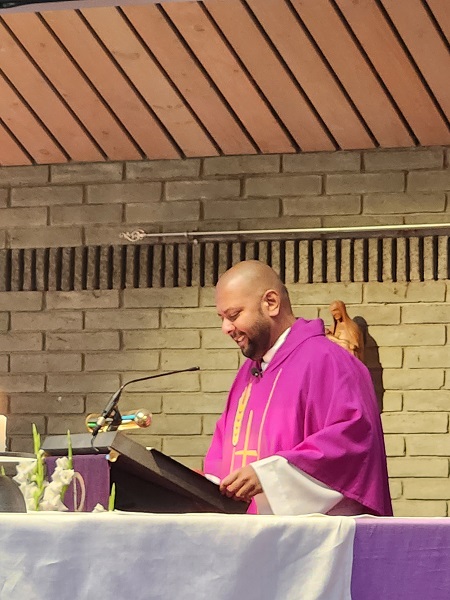
The ceremony took place at the Friday morning parish Mass at St Thomas’ church.
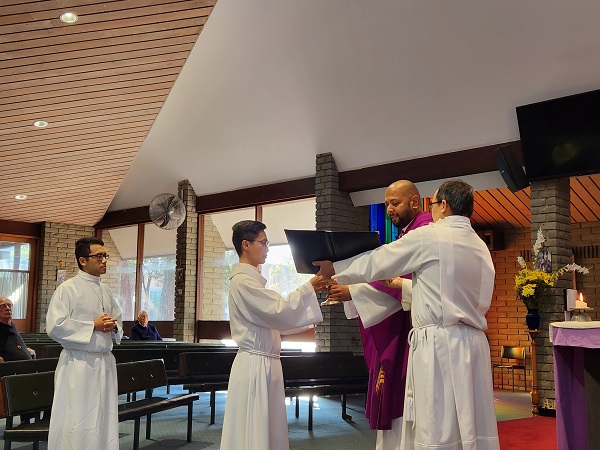
Those conferred with Acolyte were Trieu and Daniel.
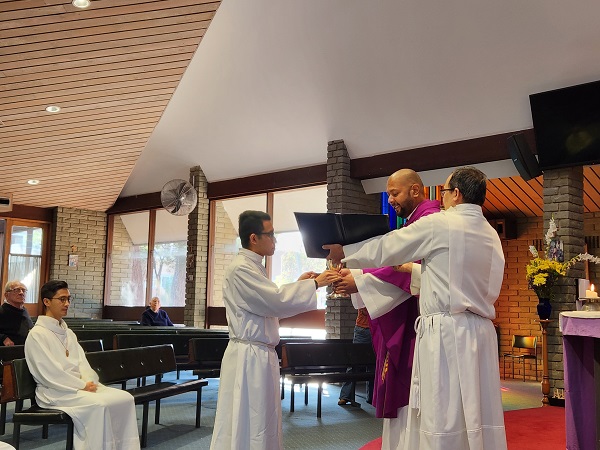
The ministry of Lector for Hoa.
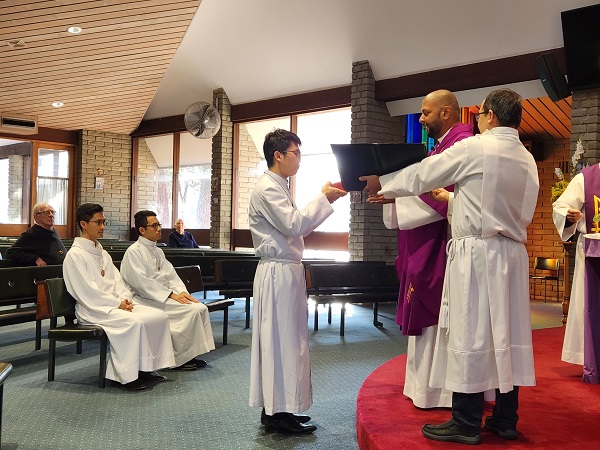
Vincent spent some years in the Paramatta seminary and received the ministries there which meant that he was able to assist Kimi.
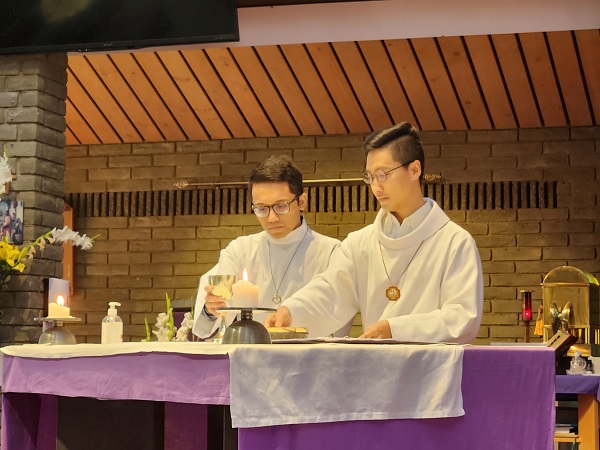
Last week, we posted the news of the beginning of the Novitiate, also at Blackburn, for Long and Nang.
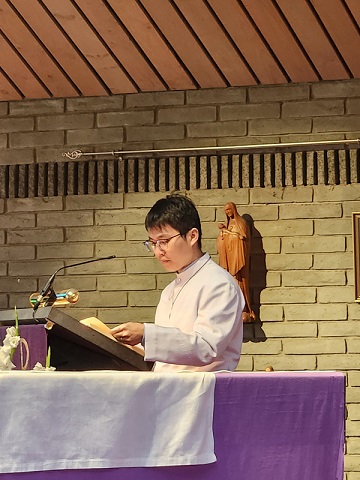
Visitors to Melbourne are welcome at Cuskelly House to meet our students who study at the Yarra Theological Union and are involved in pastoral ministries in Melbourne (and sometimes beyond)
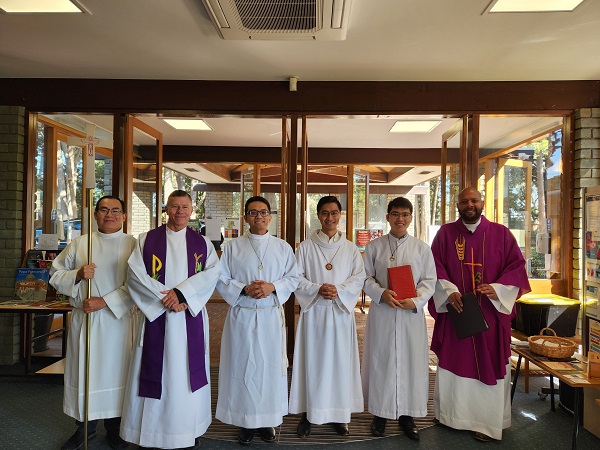
Sisi & I
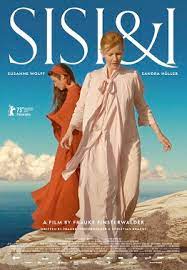
SISI & I
Germany, 2023, 132 minutes, Colour.
Sandra Huller, Suzanne Wolff, Georg Friedrich, Marcus Schleinzer, Anthony Calf, Tom Rhys Harries, Sybille Canonica, Stefan Kurt, Angela Winkler, Annette Badland
Directed by Frauke Finsterwalder
Sisi is the well-known and affectionate nickname for the Empress Elizabeth of Austria, Countess from Bavaria, married to the Emperor, Franz Joseph, Empress for four decades, whose son, Rudolf, was part of the murder-suicide pact at Mayerling.
Famous in her day, she has been the subject of theatrical dramas, television series and, from silent times not so long after her death, the focus of many films. In the mid-1950s, she was famous as being portrayed, young, by Romy Schneider in a trilogy of films. In more recent times, she was played by Vicki Krieps in Corsage. And, now, she is played by German actress, Suzanne Wolff.
However, the central character here is the Countess Irma, a Hungarian unmarried member of royalty, pressured by her dominating mother, auditioned as a companion for the Empress. In fact, Countess Irma was companion for the last four years of Elizabeth’s life, 1894-1898 when the Empress was assassinated by an anarchist.
The screenplay is a dramatisation, taking many cues from Elizabeth’s life, personality, manners, but treating them fictitiously, often with tongue-in-cheek. And this is compounded by the musical score, the range of 20th and 21st-century songs and their lyrics, something of a juxtaposition between what we hear and what we see.
Susanne Wolff’s haughtily regal as the Empress. But, this is Sandra Huller’s film, coming at the time of her great success with The Zone of Interest and Oscar nomination for Anatomy of a Fall. The film has a very strong supporting cast and some character actors for the episodes in Britain.
The setting is Corfu, the Empress separated from the Emperor, residing there, a houseful only of women, several fussing around her, and references throughout to her diet regime, considerations of health and weight, exercise, making demands on Irma. There is a visit from her effete cousin, Victor, a visit from her husband, discussions about the relationship, sexual issues, his sexual attack on her and the repercussions.
Malta stands in for Corfu and other locations, a visit to England and a meeting with Queen Victoria, the culmination in Switzerland. There is great attention to sets and decor, costumes.
Interesting in itself but also interesting when seen alongside the other versions of the Empress Elizabeth.
- The title, the focus on the Empress, her nickname, popularity, affection? The Countess Irma, her background, Hungary, pressurised, auditioned, her companionship, her love for Elizabeth?
- Audience knowledge of the Empress Elizabeth, from theatre, television, films? The image built up over the decades about her? Her actual life, from Bavaria, young, the pressure from her mother, marriage when young, mother when young, relationship with the Emperor, moving away, living in isolation, travelling, favouring Hungary? Her assassination?
- Irma, with her severe mother, the audition, her not marrying, being accepted as companion, her age, manner, manner of dress, the travel, difficult, hungry, needing a wash, but the immediate demands made on her for exercise, weights, diet, keeping her hungry? The reaction of the young attendants around the Empress, confidential, giggling? Irma and the immersion in this world?
- Costumes, décor, 19th-century elegance, pomp, aristocrats, self-absorbed, attitude towards servants, households? Class and snobbery? The musical score, the contemporary songs and lyrics, counterbalance to the 19th century opticals?
- The court, Corfu, the beauty, the coast, the hiking? The count and his attendance? Elizabeth disdain? The young women and their fussing and giggling? Irma finding her place, summoned into action, to hike, dressing, her own dresses burnt, the Empress dictating her lifestyle?
- The visit of Victor, his manner, theatrical, gay sensibility, flirtatious? His later return and care for Elizabeth, the final make up, urging her to come alive again?
- The visit of the Emperor, their separation, his attitude, his requests, sexual relationship, his demanding she go to Switzerland, his aggressive sexual attack, his departure, the consequences for her?
- The issues of exercise, fanaticism, weight, height, strict corsets, particularities of diet? The demands on Irma? The later sequences, Elizabeth persuaded to eat, her enjoyment of what she had given up for years, the effect?
- The four years for Irma, love for Elizabeth, intimacy, Elizabeth’s reactions? Keeping her distance while asking Irma to express her love and devotion?
- The visit to England, the country estate, the nobleman and his welcome, Smythe, the stables and horses, looking down on Elizabeth, the rivalry in the race, the growing intimacy, her wilfulness, deciding to leave, abandoning him? Irma and her observing the relationship, disapproval?
- Going to Switzerland, the more relaxed way of life, Elizabeth and the prospect of life and death, Irma and the knife, the embrace, the attack of the anarchist, Elizabeth wounded, dying? Irma in attendance?
- A particular portrait of the Empress Elizabeth?
Little Italy
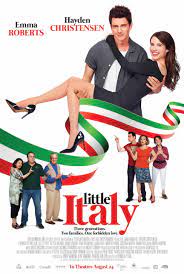
LITTLE ITALY
US, 2018, 102 minutes, Colour.
Emma Roberts, Hayden Christensen, Danny Aiello, Andrea Martin, Adam Ferrara, Gary Basaraba, Alyssa Milano, Linda Kash, Vas Saranga, Amrit Kaur, Jane Seymour, Andrew Phung, Ava Preston, Nikky Capello.
Directed by Donald Petrie.
Little Italy is a Romcom, appealing to the Romcom audience, those not into it probably wanted to give it a pass.
In fact, it is everything that might have been expected from a romantic comedy set in little Italy. It has also been described as a food film, dismissed by experts in cuisine. It really is a pizza film – and at times you can almost smell and taste pizza .
So, there are two families, the little girl in one, Nikki, delighting to be in the company of the other family’s little boy, Leo. They are inseparable. However, there is a competition, a clash between the two fathers, enmities for the next 20 years, two separate pizza parlours, side-by-side, Leo’s family’s business flourishing, Nikki’s family not.
Then, Nikki, grown-up, goes to London to be educated in cooking and restaurant management, under the eye of Jane Seymour. But, after some years, she has to return home and prepare menus for a new restaurant.
A lot of the film is then about what happens when she gets home, now a glamorous young woman, encountering Leo who has faithfully stayed with the family even though he would have liked to have had his own restaurant, their initial encounter, playful, wary, drinking, some innuendo…
A range of character actors play the parents, two husbands and wives and their interactions, but a focus also on the grandparent generation, with Danny Aiello in one of his final films as Leo’s grandfather, and Andrea Martin (so extrovertedly Greek in the Big Fat Greek Wedding films) as Nikki’s grandmother. Secret dating, proposal, dinner for all, the announcement, and the fostering of the feud.
Nikki is emotionally bewildered, in love with Leo but refusing to acknowledge it. He is in love with her. However, to solve the feud, it is decided that the families enter the competition for that year, the younger generation because the fathers have been banished from the competition. And, whoever loses, will move out.
Lots of food and excitement with the competition, the cooking, the judging, Leo winning but realising that Nikki had manipulated the sauces with the intention of her losing and leaving.
Final drama at the airport, everybody there, interrupting all the procedures, Italian loud, love, resolutions – and reconciliations.
More or less what we would expect.
33, The

THE 33
US, 2015, 127 minutes, Colour.
Antonio Banderas, Rodrigo Santoro, Juliettw Binoche, Lou Diamond Philips, Mario Casas, Gabriel Byrne, Bob Gunton, James Brolin.
Directed by Patricia Riggen.
The 33 of the title are the miners who were trapped for almost 70 days in a mountain collapse in the desert in Chile, 2010.
This is a re-enactment of the disaster, establishing the happy atmosphere of the men and their families and their village, the going to work, the suggestion that the mine in the mountain is unsafe and authorities rejecting this, the travel to the mountain, the long drive in the vehicle going further down in depth.
The disaster happens fairly quickly, collapse, injuries, the men trying to escape, gathering together, all surviving, going to the mine centre where there is shelter and some food. The film will intercut with the miners, their managing, working together, the issue of food and rationing, some prejudice against a Bolivian, the toll on the long wait.
Meanwhile, on the surface, the focus is on the women, at the fences, not given information, protesting, the group led by a very feisty Juliette Binoche.
Then there is the political response, the president of Chile, Bob Gunton, and his mining Minister, Rodrigo Santoro, humane man, inexperienced, who goes to the site, is confronted by the women, but works to find experts to come in for the drilling. They are led by Gabriel Byrne.
So, there is the intercutting between life on the surface, the establishing of a kind of village for those waiting, the media, the various experts. There is tension, mistakes made, and eventual breakthrough.
However, the ordeal was to continue, attempts to find ways in which they could bring them into the surface, drills from Australia, Canada, the United States, the need for huge magnets from Brazil to move iron blocking the descent. But, in the meantime, the men were provided with food, necessities, moral support, cameras and the ability to talk with their families.
Ultimately, the operation was a great success, the men rescued but, as the film indicated the company not found guilty of negligence, the men not compensated – but the credits sequences showing them, in fact, faces and names, and a final group photo – and the information that many of them participated in the making of the film.
Audiences might like to compare Ron Howard’s 13 Lives and the rescue of the boys from the Thai tunnel or A.J.Bayona’s Society of the Snow, the survival of the Uruguayan football team the crashed into the Andes in 1972.
- Based on a true story? A few years after the events? Some of the former miners, out of work, participating in the film? World headlines? International collaboration?
- The setting in Chile, the desert, the towns, the mine, the tunnel, the depths, the roads and vehicles, the rest centre? The president’s offices? The building up of the community outside the mine entry? The musical score, Latin overtones and instruments? The central song and its Cappuccio
- The setting, the town, the miners, preparing for work, the party gathering, Elvis’s song, happy spirits? The men, wives, daughters, the children? The status of the mine, since 1989, Don Lucho and his concerns, the boss waving them away?
- The journey to the mine, spirits, the long entry, the drive, the only way out? The image of the receding entry?
- The work, the minerals, the shifts, the collapses, the rocks falling, injuries, the men escaping, the man hanging over the abyss, the vehicles, the crashes, assembling, the 33 still alive, going to the centre?
- The drama showing the number of days, the cumulative effect? The men, interactions amongst themselves, friendly, the bigotry against the Bolivian, the issue of the food, limits, Mario as leader, with the key, over the days, controlling the meals, every 24 hours, the limits? The men and their hopes? Tensions, some with nightmares? The passing of the days, the radio not working, headlights?
- The drama the top, the women and families, at the gate, Maria, her leadership, the earlier seen giving the sandwich to her brother, speaking out, the confrontation with Laurence, getting him to promise, slapping his face, her leadership, everybody staying at the fence, throwing stones, the demands? The reaction of the authorities, the police?
- The political repercussions, the president and the Minister, the discussions, personal concerns, political concerns? The personality of the Minister, suit and tie, going to the site, the confrontation with Maria? The contact with the companies, Andre Sougarrett, his expertise, the geological aspects, mining aspects, the depths, boring into the Rock?
- The interactions between Sougarrett and Laurence, hopes, missing out by 10 m, time passing, Sougarrett prepared to give up, Laurence and the talk was Maria, learning by mistakes, Laurence and the proposed solution, Sue Garrett weary, agreeing, the new tactic? Eventually breaking through?
- The men, hearing the drilling, stopping, hopes, upset, the joy of the final breakthrough?
- The aftermath, food, clothing, technology, the cameras, the man able to talk to camera to their family? Maria disappointed, waiting for her brother? The boost of morale? The television programs, the journalist, the commentary? The issue of Mario and writing the book and the contract? The men’s reactions, his later reaction?
- The task of bringing them into the surface, the television series, the Australian solution, the Canadian solution, effective, failing? Bringing in the Americans? The discovery of the iron, the bringing in of the magnets? Able to break through? The long time?
- The capsule eventually getting through, Alex, age, his wife, pregnant, his going up, the tension with the capsule stuck, the release, his emerging, reunion? The men continually coming up, families? The background of the man with the wife and mistress and her not being allowed into the compound? His wife going off? Maria and her brother, his searching for her, the reunion?
- The impact the Laurence, his human involvement, the politics, interacting with Sougarrett and the others? With the president?
- A world achievement, collaboration, technology, rescue, the long time?
- The postscript with the actual men, faces and names, the information that the company was not held responsible, no recompense for the men? The final photo and they gather together?
Secret of Bay 5b
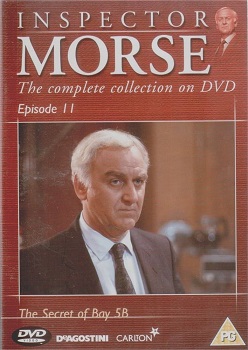
THE SECRET OF BAY 5b
UK, 1989, 103 minutes, Colour.
John Thaw, Kevin Whately, Amanda Hillwood, Mel Martin, Andrew Wilde, George Irving, Susan Kyd.
Directed by Jim Goddard.
This is one of the later episodes in the long-running Morse series on British television, 33 episodes in all. This one is from 1989.
The familiar ingredients are there: the Oxford setting though not so much emphasised this time, Morse and his moods, reflective music, interrogations, always leaning on Lewis, but a variation in his attraction towards the doctor working on the autopsies, a date, some dancing, meeting again, music… The more humane face of Morse.
The settings are more ordinary than usual, homes, police precincts, a hut out in the woods. The murder victim is found in a car in the car park. Important for the investigation are the tickets indicating times for the parking as well as theatre tickets, providing background for alibis.
The murder victim is a womaniser, relationships in the past and present. There are several suspects, a woman he was in relationship with, her alcoholic husband out in the woods, business associates. With more solving the mystery of the times on the tickets, the alibis coming apart, the murderer and the situations are not quite what we would have anticipated. Which is the enjoyment of Morse murder mystery.
1. The popularity of the long-running series? Television movies? With style? The popularity of Morse and his personality, enigmatic and mannered style? The personality of Lewis? Their relationship? The solving of the crimes? Intricacy of the plot? The psychological dimensions, the mystery and clues? Police work and solving the mysteries with their own abilities? The work of Colin Dexter?
2.The Oxford settings, the city and landscapes, the cityscapes, the buildings? Comments about Oxford and Oxford society? The ironies about Oxford and the dons? The university city? Ordinary people? Their interconnections? So much beauty – and so much crime?
3.The quality of the mysteries, character-driven? Sufficient information, sufficient clues? The exploration of character and clues?
4.John Thaw as Morse, his personality, the changes over the years, yet remaining the same? The mystery of his name? His crusty manner, the bachelor (but romantic at times)? His own authority – exercised over Lewis – and his reaction to authorities? Promotion or not? The changing of his attitudes towards Lewis, bossing him, patronising him about education and culture? The issue of music? Drinking ale? His car? Quietly at home, at work? With Lewis, understanding the situations and characters, the deductions? His being a good listener – but critical?
5.The contrast with Lewis, the family man, the ordinary policeman, education and lack of education, his being put down by Morse – but enjoying his comeuppance now and again? Music and his ignorance? The first reactions, Lewis being patient? His admiration for Morse, having to do so much leg work, to formulate hypotheses? Working under pressure? Collaborator and partner of Morse?
6.The police authorities in Oxford? The medical examiners – and Morse and his attitude towards the female authorities? Sexist and patronising? Changing? The encounters with Dr Russell, the attraction, manner of speaking, the music, dancing, the dates, the discussions? The emotional side of Morse?
7.The quality of the film as a crime thriller, a thriller with intelligence and demands on the audience?
8. The opening, the focus on Rosemary, her marriage, self-regard, reticent, the absence of George, the relationship with Michael, her gradual revelations, the interviews, her reactions, the visit to George, the car, Lewis following her, the ticket, the alibi, the lies, exposure?
9. Michael Gifford, architect, relationships, womaniser, finances, the insurance company, the suspects? The manner of his death, the reporting of the body in the car park?
10. The call-in, the body, the car, the position, the rest of the, the information?
11. The lead to Camilla, her manner, dress, composure, escort, the interview, seductive, information?
- The business partner, the artwork, the insurance, his wife, the frauds, his being unmasked?
14. Edward Manley, the company, the secretary of the welcome, the gathering, the information?
15. George, drinking, his liver, separated from Rosemary, gamekeeper, his work, Morse and the interviews? The suddenness of his death?
16.The range of alibis, the tickets for the opera, the car park, the timing? Morse and his speculations?
17. The truth, Manley visiting George, the connection with Rosemary, the death, the exposure?
Spaceman
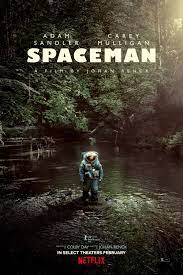
SPACEMAN
US, 2024, 103 minutes, Colour.
Adam Sandler, Carey Mulligan, Paul Dano, Kunal Nayyar, Isabella Rossellini, Lena Olin.
Directed by Johan Renck.
Spaceman is certainly a generic title. It could suggest a film about space exploration. It could suggest dramatic conflicts in space. And, it could suggest a variation on a space Odyssey.
In fact, there is something of all three possibilities here.
The star is Adam Sandler, many audiences not expecting to find him in such a serious performance after his decades of comedies, broad comedies, romantic comedies. However, in collaboration with Netflix, he has appeared in some serious roles including Uncut Gems and a particularly affecting performance as a coach in Hustle.
And, it should be said at the beginning, that Adam Sandler acquits himself very well as the spaceman, Jacub.
There is a technology side of this kind of film, the vast space craft in the future, its capacity for travelling even as far as Jupiter, the enormous interiors of the craft as well as all the signs for its maintenance, progress, and communication with. And, with a huge pink cloud hovering over Earth for several years, this is also space exploration, a mission with a single spaceman, well trained and prepared, already six months out on his travel towards Jupiter to discover the nature of this pink cloud.
But, in a different kind of way, it is also something of a space Odyssey. In 1968, Stanley Kubrick brought the phrase, Space Odyssey, into our vocabulary (over a year before the 1969 moon landing). While there is a great deal of space exploration in Kubrick’s masterpiece, there is also a philosophical (even theological) probing of what is beyond human experience, the transcendent, symbolised in that film by a vast evenly planed monolith, appearing in prehistoric times, but also present and moving through the future universe. (And one can think of such films as Gravity, First Man, Ad Astra.)
But, this time the transcendent is introduced highly imaginatively, a giant spider creature tarantula-like, an alien whose community has been destroyed, who is a survivor, interested in preserving humans, learning the language, trying to understand the motivation of the exploration. He is called Hanus and is voiced persuasively by Paul Dano.
At first, Jacub is wary, hostile, but with the conversations and the questions, gradually a report between the two, Hanus and his probing, Jacob, having already experienced some personal crisis with his wife leaving him and not communicating with him, forced to look into himself, testing himself about what he really values, even risking everything to rescue Hanus.
Which means that the transcendent themes and the personal, family themes are brought together.
Carey Mulligan plays Jacub’s disaffected wife, Lena Olin has a cameo as her mother, and Isabella Rossellini has a significant cameo role as the very businesslike public relations person behind the mission.
The film has been directed by Johan Renck, prolific video music video director, also of the challenging television series, Chernobyl.
- The title and focused? Expectations? Space exploration? A space Odyssey?
- The director, his reputation, videos, television series, Chernobyl? Adam Sandler in the central role, audience expectations, comic, serious?
- The vision of the future, space exploration? The strange pink cloud hovering over earth? The origins in Jupiter and beyond? The boundaries of the universe, its mystery, evolution, origins? Spacecraft and their complexities, the single spaceman? Contact with control? The visuals of the craft, space, of the mystery?
- Jakub? The original novel, Czech Republic, keeping the characters and setting? His life, the flashbacks, relationship with his father, informant, politics, his death? A cloud hovering over him? The flashbacks and the encounters with Lenka, love, flirting, the marriage, her pregnancy, the miscarriage? His professionalism, but his absence? Always being away, next pregnancy? The decision to leave him? The videos and his memories, his not living up to them? Attempts to contact her, moving away? Her refusal, going to stay with her mother, the contacts and the excuses, the cover? The effect on him?
- The contact on the ground, Peter, friendship, the contact, the support, the subterfuge about Lenka leaving, the press conference, Tuma and her poise, PR, covering the situation, her authority, going to visit Lenka, not communicating that she had left? The visit and talk?
- Jakub, his vision, exploration, the mystery are science, transcendence?
- Hanus and his appearance, the form of the spider, the visuals of the spider, size, movement, threat? Real? An alien, his voice, explanation of origins, the attack, adrift, learning and observing about humans, language? Initial interactions with Jakub? The voice and tone to Paul Dano?
- Lenka, the present, her reaction to Jakub, leaving, the message, going to see her mother, her mother support, the pregnancy, memories of happy days, the miscarriage, sadness, Jakub and his absences? The appeal to her to make contact?
- Hanus, his presence, Jakub’s initial reaction, fear, antipathy, the breaking down the barriers, the pace to suit with Hanus, the talk, the revelation, the cosmic dimensions, origins, the interactions between the two, companionship, emotions, Hanus in space, Jakub and the rescue? The effect of Hanus always referring to Jakub as “skinny human”.
- The breaking of the mission, the change in Jakub, the journey becoming personal? And the commitment to Hanus?
- The robbery with the South Koreans, mentioning them, the pursuit, the rescuing Jakub and his working with them?
- His future, possible reconciliation?
- A 21st-century variation on a space Odyssey?
Great Escaper, The
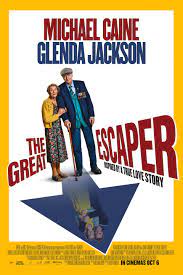
THE GREAT ESCAPER
UK, 2023, 96 minutes, Colour.
Michael Caine, Glenda Jackson, John Standing, Laura Marcus, Will Fletcher, Wolf Kahler, Danielle Vitalis, Victor Oshin, Elliot Norman.
Directed by Oliver Parker.
“Lest we forget.” A review as well as an indicator of so many of this film’s themes.
Michael Caine suggests that this will be his last film. He made it as he was turning 89 and it is a solid film and performance if it is his last. It is the last film for Glenda Jackson. She made it as she was turning 86. Both of them had won two Oscars, she two best actress, he two best supporting actor. They had toplined stage, films, television for 60 years.
And, with these stars, and their characters living in aged care, this is a film about old age and ageing – lest we forget. Caine is Bernard Jordan, Navy veteran, present at the D-Day landing. Jackson is his wife Rene, and they met 70 years earlier during the war. Both stars have some wonderful dramatic opportunities in this film, he devoted to his wife, deciding he wanted to attend the 70th anniversary of D-Day, 2014, she, unwell, yet full of verve and spirit, dry and write comments, letting him go. And, the film gives a lot of attention to the aged care staff, supervisors, doctors, nurses, orderlies, their work as well is relationships.
The film is based on an actual story, dramatised in the media in 2014, Bernie tracked down in France at the D-Day celebrations, photos and stories in the media, his going alone to the celebrations, and his nickname “The Great Escaper”
As might be guessed, this is in the best tradition of British filmmaking, taking us back to the past, gritty spirit during the war, its living on in its elderly.
And, with the D-Day theme, this film is very much Lest We Forget. The first flashback to D-Day comes as something of a surprise, very much close-up, on the boat, preparations for the landing, planes flying over, bombardment. And, throughout this film, there are continued flashbacks to D-Day in its detail, especially Bernie’s friendship with Douglas from Nottingham, killed in action. We remember Spielberg’s Saving Private Ryan and the most vivid dramatising of D-Day, the flashbacks here in that tradition.
But Rene also has flashbacks, to the war, a meeting with Bernie, and the beautiful theme of waking early in the morning and being some of the few people who watch the beauty of the Dawn.
A word of praise for veteran actor John Standing. Here we have one of his best performances, an upper-class veteran on the ferry to France, encountering Bernie, offers of friendship, sharing experiences, sharing confidences, each with a sad secret about the dead of the war, sad condemnation of the bombing of civilians, and a visit to the war cemetery.
There are many wonderful moments in the film, one well worth commenting on, the two veterans, hosted by loud Americans, but encountering a small group of German soldiers who had been present to D-Day, going to talk with them, the sadness with one of them, mutual respect, shared sorrows, weeping, and all saluting one another.
While this is definitely a film for older audiences who have long memories, one hopes that it will appeal to those who do not share such long memories but are open to appreciate them..
- The title, memories of The Great Escape, World War II films?
- This film and its British tradition, the long tradition, the war films, the British tone, transfer to the 21st-century, the D-Day is 70 years anniversary, the aged veterans, the elderly?
- The coastal town, the beachfront, the promenades, the buildings, the streets, buses? The aged care residents, the grounds, interiors, the rooms? Atmosphere?
- Bernie, this story based on fact, Bernie and his visit to France, fated, the media, the great escaper?
- The situation, 2014, 70th anniversary of D-Day, veterans and their age? The plan celebrations? Bernie missing out on the book, deciding to go, René letting him go? Packing his things, early morning, the walk, the chance meeting with Adele, missing the bus, taking the taxi, at the ferry, sitting on the deck, the drink, the encounter with Arthur, they’re talking, accents and contrast, friendship, Arthur and his offers? The effect on Bernie? The offer of the accommodation, the conversations, Arthur and his memories, his brother, the RAF, the bombing of Caen, his brother’s death, Arthur avoiding the issue? Confiding in Bernie? The outings, with the Americans, memories, the drinking, Arthur sick, alcoholic, Bernie and his support? The special tickets for the function? The encounter with the Germans, the contrast with the Americans, the sad memories, the translator, Heinrich, he and Arthur sharing Sword Beach, tears, Bernie giving them the tickets? The mutual salute?
- The importance of the flashbacks, Bernie is a young man, 20, the Navy, training, the encounter with René, the bonding, talking, sharing, the secret of the beauty of the pink Dawn? But his memories of D-Day, with Douglas, the bond, the cigarettes, the photo, the bombardment, the planes, the dangers, the landing, Douglas and his death? Bernie and never confiding this to René? Finally doing so? Memories of Douglas’s death? Persuading Arthur to go to the cemetery, both men and their memories?
- Life at aged care, the supervisor and his strictness, checking on Bernie and Renée, Adele, meeting with Bernie at the bus stop, and trouble for not reporting it, René and her support of Adele, Ponting, talking, the tower to, her mother? The orderlies and their kindness? The doctors and their attention?
- René, age, her make-up, write comments, angina, her illness, not long to live, yet not telling Bernie? Letting him go? The day without him, her write comments, dry humour, exercises with her knees, searching under the bed…?
- René and her flashbacks to the past, 70 years, who work in the war, meeting Bernie, the relationship, dancing, the pressed flower, the Dawn? Happy marriage, 70 years?
- Bernie on television, they’re seeing it at the aged care, the media, the newspaper photos, in many languages? Bernie underwear, his being feted, the official taking him to the shops, all the specials? The interviews? His return home?
- Everybody happy at aged care, watching the television? His return?
- The renewing in with René, confiding his story about Douglas, her not telling him about her health, going out to the water, wielding her along, looking at the special Dawn?
- Bernie’s death, René soon after? A quiet but significant life, the wonder of love and long marriage? Devotion?
Our Towns
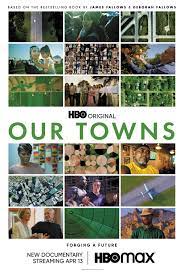
OUR TOWNS
US, 2021, 97 minutes, Colour.
Directed by Steven Ascher, Jeanne Jordan.
Our Town was a very popular play by Thornton Wilder, frequently performed, filmed, in the 1930s and 1940s. It was a focus on life in a small American town.
Renowned international journalists, James Fallows, his wife Deborah Fallows, spent many decades in Asia, reporting from China and Japan, travelling widely. In the 2000s, they returned to the United States, beginning this project, Our Towns, in the wake of the financial crisis, 2008-2009, and completing this film during the first year of Covid.
The room was directed by Steven Ascher, Jeanne Jordan, Oscar nominees for documentaries.
One of the most important aspects of this film and its survey of the United States over a decade is that it explicitly excludes focusing on the partisanship, the increasingly divided United States, especially during the presidency of Donald Trump. Rather, this is a very positive look at Americans, at Americans working together, at the building up of community and our towns.
The film was based on a series of articles and book by the Fallows. For the film, they have selected six towns, wide ranging over the United States. They have a small plane which enables them to land in more remote towns and cities. The two featured during the film, usually in conversation with people from the towns, a very genial and thoughtful couple, asking questions, very affirming in their questions and responses. They also offer their own reflections, especially at the end, in view of the range of visits.
The six towns visited are Redlands, California, part of the Inland Empire, the desert towns outside Los Angeles, where James Fallows grew up. There is also a focus on the nearby San Bernardino, declining, declared bankrupt, beginning to build up. With the growth in technology and many people wanting to live outside the big cities, the Inland Empire is having a revival. After that, there is a visit to Sioux Falls, South Dakota, memories of the Sioux nation, seeing how they have survived, but also focusing on banks and other institutions settling in South Dakota, and with industries, a reliance on the great range of migrants from so many countries.
Then there is a visit to what can be considered the poorest state, Mississippi, a visit to the city of Columbus, again a city in decline, but cultural developments, some industries, and people willing to move there. It is something the same with East Port, Maine, a harbour, a city with a hugely diminished population, changes in the fishing industry, but, again, improvements in the industry, salmon farms, people moving out of the cities, and the strongly developed cultural life.
It is something the same in the final two cities, ranging from Charlestown, West Virginia, the city in decline, the decline in mining and the coal industry, and the attempts to bring different activities to the town – especially an extraordinarily vast mural, painted on a large street wall, dramatising the life and vitality of West Virginia. The final stop is Bend, Oregon, the death of the timber industry, and, once again, people moving to the different landscapes and a city reviving, with large suburbs and an influx of people, almost becoming too large.
As a hopeful film, even an optimistic film, avoiding the political divisions of the 21st-century and focusing on American people, everyone except Native Americans being immigrants, importing immigrants to sustain new work, new industry, the developments of technology, a greater sense of community, cultural creativity.
Imaginary
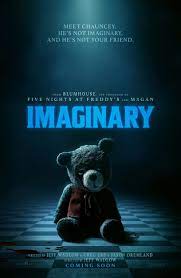
IMAGINARY
US, 2024, 104 minutes, Colour.
DeWanda Wise, Taegen Burns, Pyper Braun, Betty Buckley, Tom Payne, Veronica Falcon, Matthew Sato.
Directed by Jeff Wadlow.
Imaginary is a Blumhouse production. Over the last decade, horror aficionados have become alert to releases from Blumhouse. There have been many outstanding films, especially those from Jordan Peele, Get Out, Us, Nope, … But, as always, there can be hit and miss.
2023 set quite a good record of horror/menace films which appealed to the general public, especially Thanksgiving, Five Nights at Freddie’s. With the animal creatures at Freddie’s, there was some high expectations for Imaginary with its innocent-looking but threatening teddy bear, Chauncey.
It all opens well enough with a nightmarish sequence and a ghoulish monster. But, it is a nightmare that has pervaded the dreams for decades for Jessica (DeWanda Wise) who writes and illustrates children storybooks. Then, for quite a while, we settle into nice domesticity, Jessica has married British Max (Tom Payne) Who Is ex-wife is an institution and Jessica struggling with being stepmother to Max’s two daughters, Taylor are passively aggressive teenager (Taegen Burns) and Alice (Pyper Braun) much more friendly.
Then we are invited to explore Jessica’s past, leaving home at age 5, always drawing and imaginative, sacrifices by her father, mysterious, now in aged care. And a basement full of boxes and memories, and Alice finding the teddy bear whom she names Chauncey.
So far, so quiet, horror aficionados champing at the bit – when is it going to get scary? What about the horror?
Peaceful life begins to go awry when Alice is seen playing a game, a list of things to be done, including something that would hurt, about to put her palm down, the large threatening nail, stopped by Jessica.
And, then it begins, Alice and Jessica playing games, Taylor angrily self-absorbed, Max away on business, and Alice disappearing.
Then there is an encounter with a neighbour, Betty Buckley, Jessica’s former babysitter, memories of the mysterious past, devoting her life to writing self-published explorations of menace and evil. Is she a kind old lady? Will she try to help solve the puzzles?
Depending on your point of view on this kind of horror/menace film, there might be enough imagination in the parallels made between Alice and Jessica’s own childhood, the imaginary toy, the bear, but leading into parallel worlds. But, for those who have been patient with the domestic story, and those rabid for action, the rest of the story definitely enters the world of the imagination, an alternate world, an underground world, full of mystery and menace, and a (far too realistic-looking?) devouring monster.
For audiences who think this is all a bit much, not necessarily all comprehensible, sometimes evoking a laughter response rather than terror, a word that comes to mind while watching is that it is all becoming more and more preposterous.
The moral of the story, reinforced by the visiting psychologist and therapist, is to be wary of those who talk to, play with, depend on, imaginary friends.

